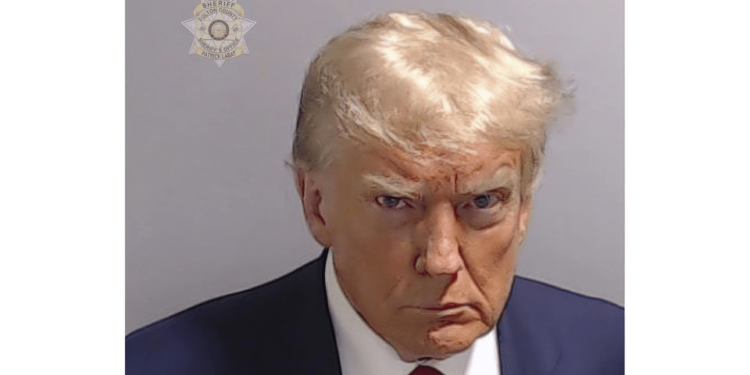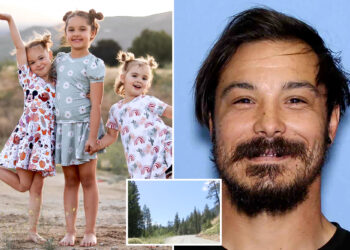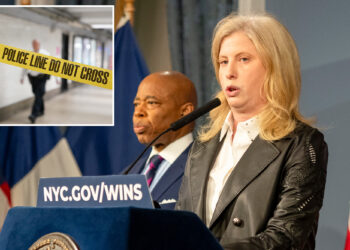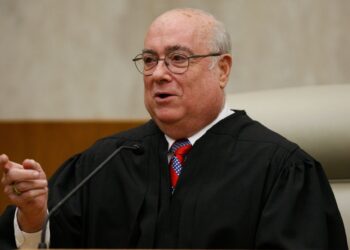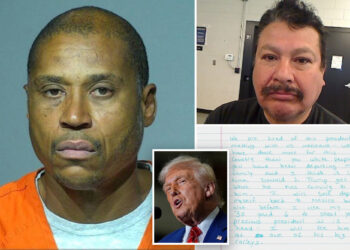Last Thursday Trump was booked in the Fulton County Jail in Atlanta, Georgia for allegedly running a criminal enterprise in violation of the state’s RICO statute. Immediately, the first and only mug shot of a former U.S. president went viral on social media and could be found on the front pages of newspapers worldwide. Here at home, the body politic was temporarily all abuzz.
To show their solidarity with the twice impeached and now four times criminally indicted Trump, Rep. Marjorie Taylor Greene (R. Ga) and other Trumpists were photoshopping the background of mug shots taken at Fulton County and posting these as fake mug shots on X, the platform formerly known as Twitter.
Though I do not think this news story will have legs, a sampling of essays from the Sunday Opinion section of the New York Times — Catch the Smug Mug on That Thug!, The Man in the Mug Shot, The Case Against Being a Good Person, and The Virtues Of Being Bad – were all indicative of what could be labeled a Neo-Freudian fixation in the struggle between democratic idealism and authoritarian nihilism.
Inquiring minds were asking, what does Trump’s scowling frown mean? What does it tell us about Trump’s state of mind? And probably more importantly, what does it say about our own individual states of mind as well as our own collective states of mind – Republican and/or Democrat?
My answers to these and other questions discussed below were prompted by a recorded interview that I did over the weekend for a story that National Public Radio was working on about the significance of Trump’s mugshot, the different political reactions to it, and its relationship to Trump’s public image and his style of branding.
Politically, Trump’s mugshot is like a Rorschach test where the MAGA base supporters, personality cultists, and other authoritarian Republicans as contrasted with the Never Trumpers, the rule of law enthusiasts, and nearly all Democrats were mostly projecting whatever they imagined onto the mug shot for a variety of their own personal, political and psychological reasons/needs.
In the case of the Trumpers, they see a defiant, angry, and revengeful victim, a savior of the anti-woke and politically incorrect people, not yet the martyr that Trump will ultimately become—whose image as a “political prisoner” — already accompanies their T-shirts and coffee mugs which they now proudly wear and drink coffee from.
As for the anti-Trumpers, they see an evil, despicable, amoral, and shameless madman, an enemy of the people, the U.S. Constitution, and American democracy. They too are drinking from coffee cups with the same mug shot of Trump that reads, Vote for Biden. Likewise, the anti-Trumpers have been wearing baseball-like T-shirts, for example, the one with the infant Donald sitting in a highchair with full diapers and dripping down on a copy of We the People… spread out on the floor beneath him.
The Mug Shot
In a few words, Trump’s mugshot image can be reconciled with the public image that he has created for himself over the years.
For nearly five decades, Trump’s brand or public image has been a work in progress. However, one common denominator over all these years is that nobody owns or controls Trump. Teflon Don has always been his own boss as well as a true grifter and gaslighter who radiates all kinds of success despite a track record of numerous fiascoes in business and in life.
At the same time, Trump is, if nothing else, a bona fide outlaw and a lawless fraudster. As I have argued in both of my Trump books the Boss is in reality the most successful outlaw in U.S. history.
To his enablers and sycophants, Trump is a revolutionary, a rebel with a neofascist agenda, and someone who does not play by the rules because the rules are for fools, suckers and other losers. By contrast, the laws or rules especially those related to taxes are not to be found within the province of winners and billionaires like Trump.
As an unorthodox politician, Trump is not quite the real deal, rather he is an authentic conman who never tells it like it really is. At the same time, Trump has evolved into the egotistical and freewheeling reality TV persona that he fashioned on The Apprentice – as in “You’re fired!” — who got away week after week for nearly a decade by being openly hostile and offensive to other people who he treated as patsy chumps most of the time.
Trump’s History With “Bad” Publicity
I do not know that Trump has a history of using bad publicity per se to his advantage as much as he has a history of using adversity and adversaries to his advantage.
In Trump’s transactional world and in his narcissistic view of things, publicity of any kind –-good, bad, and ugly — has always been useful for developing his narrative of invincibility and omnipotence regardless of his copiousness of hyper-insecurities and uber-defensiveness.
For example, who else but Donald Trump would brag about how he could shoot someone on 5th Avenue without suffering any negative consequences?
Then again, there is plenty of evidence in Trump’s political experiences from the four criminal indictments and the combined 91 felony charges that support Trump’s narrative on lawlessness. To date, Trump has yet to suffer any significant losses in support for his 2024 presidential bid for the Republican nomination.
This became perfectly clear after the first Republican presidential debate on FOX TV that aired last Wednesday night. Even if he were to be convicted of an array of very heinous crimes, six out of the eight spineless GOP wannabe candidates amazingly raised their hands that they would still support Trump’s candidacy for the highest office in the land.
This begs the question: How much more bankrupt can a political party become before it implodes?
The In Solidarity Mugshots
With respect to Trump’s supporters or Trump’s detractors, as I have already indicated it is more complicated than photoshopping mugshots of solidarity. In other words, it is less about solidarity and more about belonging to social groups and their collective identification with the reification of themselves.
From a Neo-Freudian perspective, the polarity between Trumpers and non-Trumpers or between Republicans and Democrats is a story of the classic struggle between the former collective ids and the latter collective superegos over their competing desires, grievances, and dreams for the future vis-à-vis authoritarian nihilists versus democratic idealists.
Trump is also like the fictional antihero Walter Kovacs playing the Rorschach character in the graphic novel series Watchman first published in 1986 by DC Comics.
Trump, the same as Rorschach, is a vigilante and criminal outlaw who acts on his own initiative and terms, not unlike the supervillain Joker rather than a benevolent superhero like Spiderman who is selfless, honest, compassionate and driven by moral righteousness and justice for all. Something that is of course anathema to Boss Trump.
And in this alternative Trump universe, there is no shortage of people who still romanticize or fantasize about relationships with bad guys dating back to the Wild West days of Billy the Kidd or John Wesley Harding following the Civil War or from the contemporary world of fictional graphic novels and/or films about good and evil and about superheroes and supervillains.
Having shared a range of associations or connotations about Trump’s mugshot through socio-psychological as well as multicultural lenses, I have several unanswered questions about the origins of the mugshot that only Trump or perhaps a few others could answer.
So if I had the opportunity to interview the former president, I would want to ask him at least four questions:
First, how long did it take you to come up with the scowling frown?
Second, what more are you trying to convey by way of your dark, foreboding, and unflattering image than meets the eye?
Third, were there other attitudes or expressions that you considered, and if so, what were they and why were they rejected?
Fourth, I would want to know if Trump came up with his expression for this mugshot by himself or with assistance from some of his enablers.
If he did have input from others, then I would want to know who those enablers were – though smells like the work of that “dynamic duo” Steve Bannon and Steve Miller –and did the Racketeer-in-Chief have to audition the other facial expressions before them for their thumbs up or down?
In closing, as I have already denoted I personally thought that all the mugshot buzz was highly overrated, preoccupied with a first of its kind, and has pretty much faded away in less than one week’s time. I would further imagine when all of the movies, mini-series, and documentaries start spilling forth in two or three years from now neither Trump’s mugshot nor the horrible conditions of the Fulton County Jail will get much, if any, attention.
Gregg Barak is an emeritus professor of criminology and criminal justice at Eastern Michigan University, co-founder of the Journal of White Collar and Corporate Crime, and the author of Criminology on Trump (2022) whose sequel Indicting the 45th President: Boss Trump, the GOP, and What We Can Do About the Threat to American Democracy will be published in February 2024.


